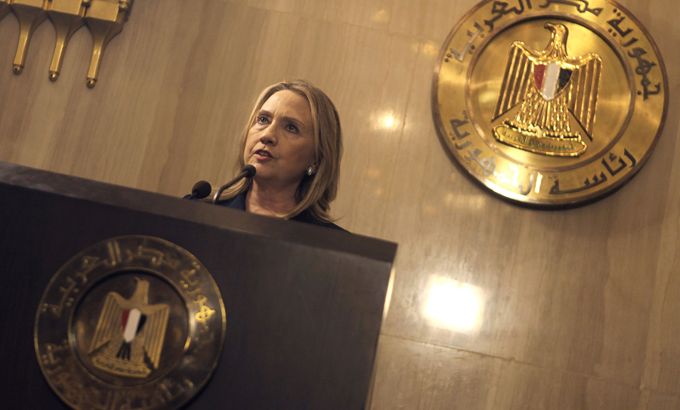Clinton supports ‘full transition’ in Egypt
Protests greet US secretary of state as she meets President Morsi and justifies past relations with the ousted regime.

Protest crowds have greeted US Secretary of State Hillary Clinton, who arrived in Cairo on Saturday to meet Egypt’s newly elected president, Mohamed Morsi, and support the country’s “full transition” to civilian rule.
Clinton’s discussions with Morsi on Saturday, part of a two-day visit, concentrated on the domestic political deadlock and economic development. She pledged hundreds of millions of dollars in debt relief, private investment and job creation funds – money the US administration had earlier promised.
The top American diplomat said her country’s “shared strategic interests far outnumber our differences” with Egypt.
“I have come to Cairo to re-affirm the strong support of the United States for the Egyptian people and their democratic transition,” Clinton said at a joint news conference with Foreign Minister Mohammed Amr.
“We want to be a good partner and we want to support the democracy that has been achieved by the courage and sacrifice of the Egyptian people,” she said. “Democracy is hard.”
 |
| Protesters criticised both the Muslim Brotherhood and perceived US meddling [AFP] |
Clinton is scheduled to meet the head of the Supreme Council of the Armed Forces, Field Marshal Hussein Tantawi, on Sunday.
The SCAF ran Egypt’s affairs after the toppling of President Hosni Mubarak in February 2011 and is locked in a political struggle with Morsi and his Muslim Brotherhood over how to direct the transition.
Clinton will also see other senior government officials, civil society and business leaders in Cairo, as well as in the country’s second city, Alexandria. Religious freedoms for the Coptic minority and women’s rights are also on her agenda.
The US has been allied with Egypt since the country signed a peace treaty with Israel in 1979 and supplies $1.5bn every year in aid, most of which goes to the military. Only occasionally did successive US governments speak out on human rights abuses under Mubarak’s government, which included restrictions on freedom of speech and assembly and the oppression of the Brotherhood.
Morsi himself was jailed during the 18-day uprising that overthrew Mubarak.
Asked if she regretted the close partnership with Mubarak, Clinton said Washington by necessity worked with the
government of the time.
She insisted, however, that “we were consistent in promoting human rights and speaking out for an end of the emergency law, and end to political prisoners being detained”.
Adel Iskandar, an Egypt expert, told Al Jazeera that Saturday’s meeting represented a “genuine turning point”.
He said the bilateral discussions marked “a real tectonic shift in the balance of power in the Arab world at large… that you can have a moderate, co-operative Islamist government which has mutual interests with the US… an example of how a middle ground could be forged”.
Iskandar also said the current Egyptian government appeared ready to “move forward” despite past US support for Mubarak, and that the “American government would put its money behind both horses [the military and the Muslim Brotherhood] in this race”.
US role in Egypt
It is Clinton’s second visit to the Arab world’s most populous nation since the uprising. Earlier this week, Clinton urged dialogue between all parties in the ongoing constitutional dispute.
Yussef Auf, a judge and constitutional scholar, told Al Jazeera: “I think the best phrase they can use now is what Obama said to Morsi [during a telephone call]. We should maintain relations between the two countries on the ‘mutual basis of respect’.”
|
|
| Al Jazeera speaks with constitutional scholar Yussef Auf |
The meeting at the presidential palace kicked off a series of high-level sessions aimed at stabilising Egypt’s fledgling democracy and its alliance with the US, once rock-solid but now increasingly shaky.
“Above all [the US] wants to avoid any new confrontations between the civilian leadership and the military leadership… over the fate of the Egyptian parliament elected by the Egyptian people and dissolved by a court order,” said Al Jazeera’s Jacky Rowland, reporting from Cairo.
A day earlier, two US tourists were taken hostage in the Sinai Peninsula by Bedouin tribesmen seeking the release of an imprisoned kinsman.
Our correspondent said that the question of border security on Egypt’s long border with Israel is being discussed during Clinton’s visit, especially the issues of human trafficking, illegal migration and weapons smuggling.
She said, “To an extent we have seen changes” in Egypt’s relationship with Israel since the fall of Mubarak, “particularly with their policy on the Gaza Strip, where some 1,000 to 1,500 people are now crossing per day at Rafah”.
“Clinton concluded [her talks] with an appeal to the new Egyptian leadership to maintain the peace treaty with Israel, which as far as the US is concerned, is the backbone of stability in the region.”
A large and vocal crowd massed outside the hotel where Clinton was staying in Cairo, chanting and carrying anti-American signs.
Clinton is on a regional visit and will travel to Israel next, where she is expected to meet with top officials.